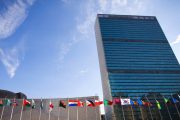
In a development that has garnered significant attention, the Federal Bureau of Investigation (FBI) recently initiated an investigation into a faith group to which Supreme Court Justice Amy Coney Barrett belongs. This investigation follows just months after a previous investigation of Catholics by the FBI sparked a national debate, touching on issues of religious freedom, legal ethics, and the separation of powers.
According to a story published by The Guardian, the FBI’s primary motivation behind its investigation of the Indiana-based People of Praise is concerns related to claims of abuse made by former members. Certainly the group’s potential influence on Justice Barrett is a significant factor, as well, given that she’s been associated with People of Praise for decades. Given her strong ties to the faith community, questions have arisen about whether her judicial decisions might be influenced by her religious beliefs. During her confirmation hearings in 2020, critics of Judge Barrett painted People of Praise as a group promoting misogyny and existing in the radical far-right. None of that, however, is something that is within the purview of the federal government, including the unconstitutional federal law-enforcement apparatus.
As this investigation unfolds, it will undoubtedly be closely monitored by legal scholars, religious-freedom advocates, and the American public at large. It underscores the ongoing need to protect an individual’s faith and prevent the FBI and all other agencies of government from infringing on the natural right to freely exercise the religion of one’s choice, as guaranteed by the First Amendment.
In recent months, the FBI has undertaken investigations into various Catholic groups and organizations, raising questions about the balance between religious freedom and national security. This development has generated significant debate, as it involves sensitive topics such as religious freedom, government overreach, and the protection of citizens.
According to numerous reports in the media, the FBI’s investigations into traditional Catholic groups included the collusion of several FBI offices in targeting and monitoring the activities of traditional Catholics in an effort to identify potential domestic terrorists.
In April, Republicans exposed a scheme being perpetrated by the FBI wherein the G-men would encourage members inside Catholic churches to spy on their fellow churchgoers and inform the FBI of any “religious extremism” in the various congregations. The FBI defended this as an effort to root out the religious extremism that morphs into terrorism.
If the FBI did not exist, however, there would be no need for Catholics — or adherents of any faith — to defend their beliefs and to be wary of speaking freely for fear of being recorded and reported to the federal government’s domestic spy ring.
While religious institutions can be fertile ground for the radicalization of individuals, federal intervention would be unnecessary as that very radicalization, by definition, exposes the extremist to the censure of the other, moderate members of the faith. The FBI, however, not only does not simply punish crimes, it creates criminals ex nihilo. The agency’s creation of an extremist threat so that the people will clamor for safety from extremist threats has been the modus operandi of tyrants and their supporters for millennia. Consider the story of Pisistratus of Athens.
Pisistratus was a man who wanted desperately to be the sole ruler of Athens. He tried for years, and then around 560 B.C. came up with a scheme that finally worked. He waited until Athens was torn apart by partisan conflict, and then he and some of his supporters rode out of town, cut themselves and their animals with swords and knives, and then rode back into Athens, telling the people that they had been attacked and nearly killed by a group of violent murderers.
The Athenians, motivated by fear of attack by the made-up murderers, allowed Pisistratus and his supporters to seize the people’s weapons (to prevent additional violence) and take them up to the hill in Athens where the government sat — the Acropolis. Then, claiming that there was still a grave threat from the violent murderers, Pisistratus and his supporters fortified the hill and surrounded it with armed guards, insisting, still, that such drastic measures were necessary to keep the government and the people safe from armed criminals.
The FBI’s “infiltration” of Catholic (and other Christian and Muslim) churches for the purpose of ferreting out “extremists” is nothing more than the Pisistratus gambit for tricking people into pleading for “protection,” protection they only need because of a threat created out of thin air.
Religious freedom is a cornerstone of the American Republic, enshrined in the First Amendment to the Constitution. It guarantees every citizen the right to practice his faith without fear of government interference or persecution. The freedom to worship and associate with like-minded individuals is sacrosanct in our nation’s history.
However, the FBI’s “investigation” of People of Praise and any and all other religious groups highlights the lack of control over an agency with surveillance and police power more immense than anything Pisistratus could have imagined.
The Constitution’s First Amendment explicitly states, “Congress shall make no law respecting an establishment of religion or prohibiting the free exercise thereof.” This clause serves as a bulwark against government intrusion into religious affairs. Yet, these instances where the FBI has delved into the activities of religious organizations raise questions about the sanctity of these constitutional principles.
While national security is of paramount importance, it cannot come at the expense of our fundamental rights. The FBI’s investigations of religious groups can lead to a chilling effect on religious expression, as congregants may fear surveillance or monitoring simply for practicing their faith. This undue intrusion into religious affairs not only violates the spirit of the First Amendment but also raises concerns about religious discrimination.
Moreover, the FBI’s actions can potentially undermine the trust and rapport that should exist between religious communities and law-enforcement agencies. Such investigations may sow seeds of distrust and suspicion, harming the cooperation needed for effective community policing and genuine counterterrorism efforts.
It is essential to recognize that actual threats to national security should be addressed through targeted investigations based on concrete evidence of wrongdoing, rather than sweeping, suspicion-based surveillance of religious groups. Our Founding Fathers were acutely aware of the potential for government overreach, which is why they enshrined these protections in the Constitution.
The FBI’s investigation and attempted infiltration of traditional Catholic congregations, People of Praise, and all other religious groups not only infringes upon the fundamental rights of Americans, but also risk eroding the trust and cooperation needed for effective law enforcement, that is to say, enforcement of actual laws against actual criminals. The FBI is creating criminals as a way to create laws as a way to justify its existence. This charade — this assault on liberty and demoralization of decent people — has gone on long enough.
We must remain vigilant in upholding our constitutional principles, ensuring that religious freedom remains inviolate and protected from government overreach. Balancing security and liberty is a delicate task, but it is one that must be undertaken with utmost care and respect for our foundational values and must be carried on in constitutional, moral, and legal ways, without resort to entrapment or infringement.


